Thirty Four
The inspriring true story of Albert Goering, By William Hastings Burke
Summary

| Content | 7/10 |
| Readability | 7/10 |
| Presentation | 6/10 |
| Ideas | 8/10 |
| Value for money | 7/10 |
| Did it do what it said on the box? | 7/10 |
How do the rankings work?
The Review
An inspiring true tale of a very unexpected hero
Imagine you are a wealthy industrialist, but also a humanitarian with a keen sense of justice. Imagine you live in a brutal totalitarian regime which is waging war over half the world and subjecting those under its control to acts or repression and genocide the like of which the world has never seen.
OK? Now imagine that your brother is one of your country’s top military and political leaders. He’s Hermann Goering, and you are his younger brother Albert.
Thirty Four is the remarkable story of how Albert Goering protected and saved the threatened and dispossessed throughout the duration of the Third Reich. He also led acts of anti-Nazi defiance and even sabotage. His innumerable exploits ranged from moving people round the Skoda empire to places where they would be less vulnerable, through remarkable political interventions such as persuading Goebbels to classify Franz Lehar’s Jewish wife as an “honorary Aryan”, to acts of almost unbelievable audacity like driving a convoy to a concentration camp, demanding that it be filled with “workers” for Skoda, and then freeing those supplied in a nearby forest. What’s even more impressive is that through a combination of the protection afforded by his brother’s name, his own charm and political skill, and Hermann’s occasional protective or helpful interventions, he survived to tell the tale.
I’m always captivated by these “edge” stories from history, of those who didn’t fit the mould, and this is a fascinating, uplifting and inspiring tale. It’s not a hagiography – Albert’s personal weaknesses and his difficult post-war years are fully acknowledged – but throughout there’s a strong sense of his moral compass and his need to do something.
Although almost forgotten by history, Albert Goering needs to be remembered alongside Schindler and Wallenberg, and this book attempts to make that a possibility.
William Hastings Burke has made a decent job of telling the story, although by his own admission it should probably have been researched and told twenty years earlier, when it might have been possible to talk to those who knew Albert Goering themselves, rather than their descendants. The style of the book is deliberately chatty, mixing historical findings, dialogue from interviews and the author’s own wry observations from travelling around Europe with limited support and an even more limited budget.
If I have a complaint, it’s that the book is a bit short (maybe reflecting the difficulty of researching very personal stories at this distance), and it would have been great to include a few photographs of the central characters. However, these are minor niggles.
This is a good read, and very inspiring. Recommended.
Buy It From Amazon
Amazon.co.uk  |  | Amazon.com
|

 Thoughts on the World (Main Feed)
Thoughts on the World (Main Feed) Main feed (direct XML)
Main feed (direct XML)